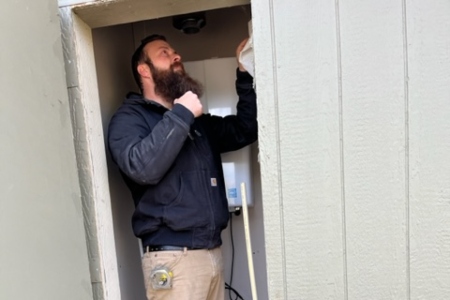Choosing Your Next Water Heater: Traditional vs. Tankless

Is your old water heater getting up there in age, or is it continuously malfunctioning on you? If so, it's probably time to make the change and upgrade to a new water heater. The question is, do you stick with a tried-and-true traditional model, or do you opt for the more modern, energy-efficient tankless model?
There are great options in both of these categories, but whether or not a traditional heater or tankless heater is right for you comes down to factors like your budget, your energy usage, and your hot water consumption needs. Let's go over the merits and drawbacks of both options to paint a better picture:
Traditional Tanked Water Heaters
Traditional tanked water heaters work by storing a large volume of water in an insulated tank and heating it continuously to maintain a consistent temperature. When hot water is needed, the heated water is drawn from the tank and replenished with cold water, which is then heated again.
Pros
- Lower Upfront Cost: Traditional heaters are much cheaper than tankless models on average. This can make them a more appealing option for budget-conscious homeowners.
- Consistent Hot Water Supply: With a large storage tank to hold heated water, traditional tanked water heaters provide a consistent supply of hot water for household needs, making them suitable for larger families or homes with high hot water demand.
Cons:
- Limited Lifespan: Tanked water heaters typically have a lifespan of 8 to 12 years, after which they may require water heater repair and replacement. Regular maintenance is essential to prolong the lifespan of these units and prevent issues such as corrosion and sediment buildup.
- Energy Inefficiency: Tanked water heaters continuously heat and store water, leading to energy loss through standby heat loss. This inefficiency can result in higher energy bills over time compared to tankless models.
Tankless Water Heaters
Tankless water heaters work by heating water directly as it flows through a heat exchanger, without the need for a storage tank. When hot water is needed, cold water passes through the heat exchanger, where it is rapidly heated to the desired temperature and then delivered to the faucet or shower.
Pros
- Energy Efficiency: Tankless water heaters only heat water as needed, eliminating standby heat loss and reducing energy consumption. This can result in significant savings on utility bills over time, making tankless models a more environmentally friendly option.
- Longer Lifespan: Tankless water heaters typically have a longer lifespan of 20 years or more, outlasting traditional tanked models. While they may require occasional plumbing services for maintenance, they generally have fewer repair needs over time than traditional heaters.
Cons
- Higher Upfront Cost: Tankless water heaters have a higher initial cost compared to traditional tanked models, which may deter some homeowners from making the investment. However, the long-term energy savings and extended lifespan can offset this initial expense.
- Limited Hot Water Output: Although tankless water heaters provide hot water on demand, they may struggle to keep up with simultaneous hot water demands in larger households.
Consult a Water Heater Expert
As water heater repair & replacement experts, we work with both systems equally and can help find the right fit for every household. Even within these two broad categories, there are a lot of options to choose from, and we can narrow them down to the one that's within your budget, matches your water needs, and maximizes your energy savings.
Bighorn Plumbing offers smart, prompt, and professional water heater & replacement services to Carson City locals. We provide a wide array of plumbing services and are glad to help customers find the perfect water heater to upgrade their homes. If you're ready to replace your old heater and want to talk options, give us a call today at (775) 977-1010!
